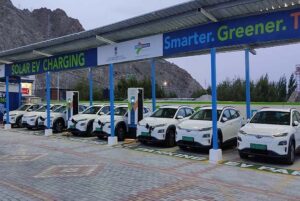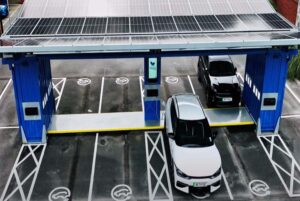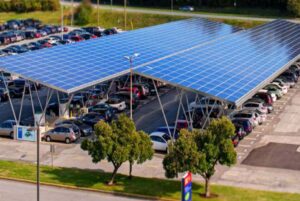 Sensing the impending decline of climate change and the rapid depletion of fossil fuels, the transition towards green mobility specifically to electric vehicles (EVs) has intensified in the last few years.
Sensing the impending decline of climate change and the rapid depletion of fossil fuels, the transition towards green mobility specifically to electric vehicles (EVs) has intensified in the last few years.
Nonetheless, widespread adoption of EVs is strictly contingent on the rapid development of a robust charging infrastructure.
Traditional charging stations often rely on non-renewable energy sources, contributing to the very environmental problems EVs are designed to combat.
This is where the Solar EV Charging Network comes into play, offering a sustainable and eco-friendly solution.
To understand why we need Solar EV Charging Network, let’s take a look at the various reasons this network holds greater significance for new-generation vehicles.
Why is Solar EV Charging Network Needed?
 To grasp the concept of why Solar EV Charging Network is the need of the hour, we must understand its significance and impact on the overall ecosystem.
To grasp the concept of why Solar EV Charging Network is the need of the hour, we must understand its significance and impact on the overall ecosystem.
Reducing Carbon Footprint
The transportation sector is a significant contributor to greenhouse gas emissions. Solar EV Charging Network has the potential to significantly reduce the carbon footprint of electric vehicles. By harnessing solar energy, these stations can provide clean, renewable power to charge EVs, making them a key element in the fight against climate change.
Energy Independence
Solar EV Charging Network can help reduce dependence on non-renewable energy sources, which are often imported and subject to price fluctuations. Solar power, on the other hand, is abundant and locally available. By generating their electricity, these stations offer energy independence and resilience to energy fluctuations.
Cost Savings
Electric vehicles are already more energy-efficient and cost-effective in the long run compared to traditional internal combustion engine vehicles. Solar EV Charging Network can enhance these cost savings further by reducing or even eliminating the need to pay for electricity, as they rely on the sun’s energy.
Electric Grid Independence
The integration of the Solar EV Charging Network can also help alleviate pressure on the electrical grid, especially during peak demand hours. This can prevent grid overloads and reduce the need for costly grid expansions.
Support Renewable Energy
By utilizing solar energy for EV charging, we promote the use of renewable energy sources. This not only reduces carbon emissions but also fosters the growth of the renewable energy sector, creating jobs and supporting sustainable energy practices.
Challenges of Implementing Solar EV Charging Stations
 After understanding the importance of Solar EV Charging Network, we must be familiar with several challenges that hamper its widespread adoption.
After understanding the importance of Solar EV Charging Network, we must be familiar with several challenges that hamper its widespread adoption.
High Initial Costs
One of the primary challenges that charging operators encounter is the high initial cost of setting up a Solar EV Charging Network. The installation of solar panels and the associated infrastructure can be expensive, deterring many businesses and governments from investing in this technology.
Limited Range
Solar charging stations can have limited capacity, which may result in long wait times during peak usage hours. This limitation can be a deterrent to EV owners who rely on these stations for their daily charging needs.
Weather Dependence
The effectiveness of solar panels is highly dependent on weather conditions. Cloudy days, rainy weather, or the absence of sunlight at night can affect the charging capabilities of solar EV stations, potentially leaving EV owners without access to reliable charging.
Space Constraints
Solar panels require a significant amount of space to generate adequate power. In urban areas, finding enough space for solar panels while accommodating parking and charging infrastructure can be a logistical challenge.
Energy Storage
Solar EV Charging Stations require energy storage solutions to provide consistent charging capabilities, even during nighttime or on cloudy days. The cost and maintenance of energy storage systems are additional hurdles to overcome.
Permitting and Regulations
Building solar EV charging stations can be hampered by complex permitting processes and regulations that vary from one jurisdiction to another. Streamlining and standardizing these procedures would facilitate their development.
Integration with the Grid
Coordinating solar EV charging stations with the electrical grid can be complex. This includes managing the flow of electricity from the solar panels, ensuring that excess energy is stored or fed back into the grid, and integrating payment systems.
Maintenance and Repairs
Solar panels and associated equipment require regular maintenance and occasional repairs. Developing a maintenance plan and ensuring skilled technicians are available can be a challenge, especially in remote or less populated areas.
Wrapping Up
 The need for establishing a Solar EV Charging stations is evident in the global efforts to combat climate change and transition to sustainable energy sources.
The need for establishing a Solar EV Charging stations is evident in the global efforts to combat climate change and transition to sustainable energy sources.
To address these challenges, governments, businesses, and communities must collaborate to invest in research, development, and infrastructure. Incentives, subsidies, and standardized regulations can help accelerate the deployment of Solar EV Charging Network at a mass scale.
As technology advances and economies of scale are realized, the vision of a future with abundant, convenient, and sustainable EV charging infrastructure powered by the sun becomes increasingly attainable. Solar EV Charging Network represent a critical step toward a greener, more sustainable future in the realm of transportation.
